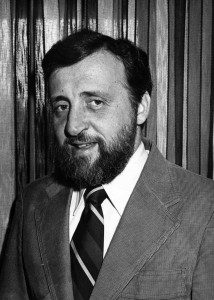
This semester marked Richard Mouw’s last as president of Fuller Theological Seminary. Described by historian Grant Wacker as the “the most influential Evangelical voice in America—a true Evangelical public intellectual,” Mouw began teaching at Fuller in 1985, became provost in 1989, and then president in 1993. He has been praised for his interfaith activities with Mormons and Catholics, generous orthodoxy, and keen Reformed mind. He retires this year after fifteen years at the helm of one of evangelicalism’s most important seminaries. (For pictures of his retirement celebrations, click here and here.)
Mouw’s life and career embody the convergence of the Dutch Reformed community and neo-evangelicalism. Baptized in 1940 as an infant in the First Holland Reformed Church of Passaic, New Jersey, Mouw grew up among first- and second-generation Dutch immigrants. Some in fact still worshiped in Dutch-language services on Sunday afternoons. But as Mouw’s mother, a member of the First Holland congregation, cradled young Mouw in her arms and presented him for baptism as a “covenant child,” his father, a more typical homegrown evangelical, looked on suspiciously from the front pew. The product of an irreligious family and a dramatic conversion experience in his teens while a hillbilly musician, Mouw’s father prayed that his son would “someday realize that only a personal faith in Jesus, and not the rituals of the church, could guarantee [his] eternal salvation.”
And so young Mouw grew up with a foot each in the worlds of neo-evangelicalism and the Dutch Reformed. With his father, he smelled the sawdust in fundamentalist revival meetings. Vaguely anti-Catholic and stridently anti-mainline, he forged friendships within the broad transdenominational world of mid-twentieth-century evangelical conservatism. He attended summer Bible camps with intricate dispensationalist end times charts on the walls. He read Moody Bible Institute devotional guides. Like millions of others in the 1950s, the teenage Mouw was overcome “with a profound sense that God was speaking directly to me” and made the long trek forward toward Billy Graham on the stage at Madison Square Garden to “make a decision for Christ.” “Surrounded by thousands of people,” he remembers, “I felt that I was alone in the presence of the Eternal.” (For a mini-biography of Mouw, read Chapter Seven of my book Moral Minority.)

After college at Houghton and graduate school at the University of Chicago, Mouw recovered his Reformed roots as a philosopher at Calvin College. This college in Grand Rapids, Michigan, was enjoying a golden age in the 1970s. Imagine faculty meetings with the all-star lineup of George Marsden, Nicholas Wolterstorff, Alvin Plantinga, et. al. But Mouw also hung out with neo-evangelicals in the Wheaton-Christianity Today-InterVarsity orbit. He spoke graciously and inclusively of a common “evangelical self-understanding” as he interacted with evangelicals on social action.
As an important member of the nascent “evangelical left” of the 1970s (Mouw and colleagues joined the NAACP, antiwar protests, and urban renewal efforts in Grand Rapids), he pushed evangelicals preoccupied with personal salvation toward a simultaneous embrace of social justice. In the aptly titled Political Evangelism, Mouw denounced the “political passivity that has often been the posture of a culture-denying fundamentalism.” Evangelism, rather, should integrate personal salvation and political activism. Jesus, he wrote, “came to rescue the entire created order from the pervasive power of sin.” Christ’s atoning work “offers liberation for people in their cultural endeavours, in their institutions and the making of public policy.” Political Evangelism came squarely out of the Reformed ethos of Calvin College. Excerpts from the book had been previously published in the Reformed Journal, and in the preface Mouw thanked members of Calvin’s weekly Reformed colloquium. Although greatly influenced by these colleagues, it was his fundamentalist background that helped Mouw translate Reformed thought into language that evangelicals could understand.
Fuller Seminary was a fitting place for Mouw to land. It remains broadly evangelical, but substantially Reformed (as the title of historian George Marsden’s history of Fuller suggests). In fact, his successor is a Presbyterian minister. But the seminary is not uniformly Reformed. Donald Dayton has uncovered a substantial non-Reformed history there. Baptists, Wesleyans, and Anabaptists make their home at Fuller. And it is important to note that the Reformed ethos emanating out of Fuller and Calvin is rather different than the more strident “young, restless Reformed” crowd at Southern Baptist Theological Seminary in Louisville and Mars Hill Church in Seattle. Mouw may not make the news as much as Mohler, but he represents a very important sector of American evangelicalism.












